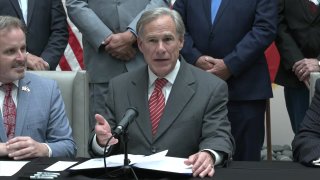
The Biden administration on Thursday sued Texas over new voting laws that outlasted a summer of dramatic protests by Democrats, who face fading hopes of overhauling the nation's elections in response to a wave of restrictive new rules in Republican-led states.
The lawsuit targets provisions surrounding mail-in voting requirements and voter assistance outlined in the Voting Rights Act and Civil Rights Act but does not challenge the entirety of the sweeping legislation signed in September.
“Our democracy depends on the right of eligible voters to cast a ballot and to have that ballot counted,” said Attorney General Merrick B. Garland in a DOJ statement. “The Justice Department will continue to use all the authorities at its disposal to protect this fundamental pillar of our society.”
The DOJ said the complaint contends that Texas SB1 violates Section 208 of the Voting Rights Act "by improperly restricting what assistance in the polling booth voters who have a disability or are unable to read or write can receive. The complaint alleges that SB1 harms those voters by barring their assistors from providing necessary help, including answering basic questions, responding to requests to clarify ballot translations or confirming that voters with visual impairments have marked a ballot as intended."
The DOJ also said the complaint contends SB1 violates Section 101 of the Civil Rights Act of 1964 "by requiring rejection of mail ballots and mail ballot request forms because of certain paperwork errors or omissions that are not material to establishing a voter’s eligibility to cast a ballot. The complaint asks the court to prohibit Texas from enforcing these requirements."
“The Civil Rights Division is committed to protecting the fundamental right to vote for all Americans,” said Assistant Attorney General Kristen Clarke for the Justice Department’s Civil Rights Division in a statement. “Laws that impair eligible citizens’ access to the ballot box have no place in our democracy. Texas Senate Bill 1’s restrictions on voter assistance at the polls and on which absentee ballots cast by eligible voters can be accepted by election officials are unlawful and indefensible.”
Get Tri-state area news delivered to your inbox. Sign up for NBC New York's News Headlines newsletter.
Abbott and other Texas Republicans said the changes provide safeguards against voter fraud, which is rare.
The governor jumped on Twitter Thursday afternoon asserting to the Biden Administration he and his administration were ready to defend the law, which he said is legal, in court.
"Bring it," Abbott tweeted, adding the law increases the hours to vote, restricts illegal mail ballot voting, and makes ballot harvesting a felony.
In September, commenting on the signing of State Sen. Bryan Hughes' (R-Tyler) bill, Texas Gov. Greg Abbott (R) refuted claims the law was veiled voter suppression and that it made it easier to vote, harder to cheat.
"Senate Bill 1 ensures trust and confidence in our elections system," said Abbott. "Safe and secure elections are critical to the foundation of our state ... I am proud to sign Senate Bill 1 into law to uphold the integrity of our elections in Texas."
The governor was joined on Twitter Thursday by the state's attorney general who said, "Biden is coming after Texas for SB1" and "I will see you in court, Biden!"
Texas Attorney General Ken Paxton also said the legislation is, "a great and much-needed bill. Ensuring Texas has safe, secure, and transparent elections is a top priority of mine."
Opponents of the Texas law had already sued the state, accusing Republicans of setting out to disenfranchise minorities and other Democratic-leaning voters.
The legislation in Texas set off a summer of walkouts by Democrats, Republicans threatening them with arrest, and Abbott vetoing the paychecks of thousands of rank-and-file staffers when the bill failed to reach him sooner. At one point, more than 50 Democratic lawmakers decamped to Washington, bringing the Texas Capitol to a grinding halt for 38 days.
Democrats had hoped to pressure Congress into passing new voting rights protections at the federal level. Both those efforts have stalled, including another attempt Wednesday.
Other GOP states also rushed to pass more restrictive elections laws following the 2020 election and President Donald Trump's false claims that it was stolen. Trump has called on Abbott to audit the election results in Texas, even though he won the state.
The Department of Justice said they also filed a statement of interest Thursday in a Texas federal court, in litigation brought by private plaintiffs challenging SB1. The statement of interest addresses issues related to Section 2 of the Voting Rights Act, including explaining that Section 2 permits private plaintiffs to file suit to remedy racially discriminatory voting practices.

